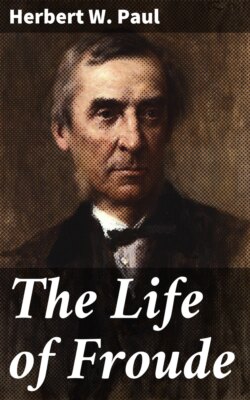Читать книгу The Life of Froude - Herbert W. Paul - Страница 6
На сайте Литреса книга снята с продажи.
CHAPTER III LIBERTY
ОглавлениеFroude's position was now, from a worldly point of view, deplorable. For the antagonism of High Churchmen he was of course prepared. "Never mind," he wrote to Clough of The Nemesis, "if the Puseyites hate it; they must fear it, and it will work in the mind they have made sick." But he was also assailed in the Protestant press as an awful example of what the Oxford Movement might engender. His book was denounced on all sides, even by freethinkers, who regarded it as a reproach to their cause. The professors of University College, London, had appointed him to a mastership at Hobart Town in Australia, for which he applied the year before in the hope that change of scene might help to re-settle his mind. On reading the attacks in the newspapers they pusillanimously asked him to withdraw, and he withdrew. A letter to Clough, dated the 6th of March, 1849, explains his intellectual and material position at this time in a vivid and striking manner.
"I admire Matt. to a very great extent, only I don't see what business he has to parade his calmness, and lecture us on resignation, when he has never known what a storm is, and doesn't know what to resign himself to. I think he only knows the shady side of nature out of books. Still I think his versifying, and generally his aesthetic power is quite wonderful. … On the whole he shapes better than you, I think, but you have marble to cut out, and he has only clay. … Do you think that if the Council do ask me to give up I might fairly ask Lord Brougham as their President to get me helped instead to ever so poor an honest living in the Colonies? I can't turn hack writer, and I must have something fixed to do. Congreve is down-hearted about Oxford: not so I. I quite look to coming back in a very few years."
The Archdeacon, conceiving that the best remedy for free thought was short commons, stopped his son's allowance. Froude would have been alone in the world, if the brave and generous Kingsley had not come to his assistance. Like a true Christian, he invited Froude to his house, and made him at home there. To appreciate the magnanimity of this offer we must consider that Kinglsey was himself suspected of being a heretic, and that his prominent association with Froude brought him letters of remonstrance by every post. He said nothing about them, and Froude, in perfect ignorance of what he was inflicting upon his host, stayed two months with him at Ilfracombe and Lynmouth. Yet Kingsley did not, and could not, agree with Froude. He was a resolved, serious Christian, and never dreamt of giving up his ministry. He did not in the least agree with Froude, who made no impression upon him in argument. He acted from kindness, and respect for integrity.
Froude, however, could not stay permanently with the Kingsleys. His father would have nothing to do with him, and in his son's opinion was right to leave him with the consequences of his own errors. But the outcry against him had been so violent and excessive as to provoke a reaction. Froude might be an "infidel," he was not a criminal, and in resigning his Fellowship he had shown more honesty than prudence. His position excited the sympathy of influential persons. Crabb Robinson, though an entire stranger to him, wrote a public protest against Froude's treatment. Other men, not less distinguished, went farther. Chevalier Bunsen, the Prussian Minister, Monckton Milnes, afterwards Lord Houghton, and others whose names he never knew, subscribed a considerable sum of money for maintaining the unpopular writer at a German university while he made a serious study of theological science. But he had had enough of theology, and the munificent offer was declined, though Bunsen harangued him enthusiastically for five hours in Carlton Gardens on the exquisite adaptation of Evangelical doctrines to the human soul, until Froude began to suspect that they must have originated in the soul itself.
At this time a greater change than the loss of his Fellowship came upon Froude. While staying with the Kingsleys at Ilfracombe, he met Mrs. Kingsley's sister, Charlotte Grenfell, the Argemone of Yeast, a lady of somewhat wilful, yet most brilliant spirit, with a small fortune of her own. Miss Grenfell had joined the Church of Rome two years before, and at that time thought of entering a convent. This idea was extremely distasteful to her sister and her sister's husband. Their favourite remedy for feminine caprice was marriage, and they soon had the satisfaction of seeing Miss Grenfell become Mrs. Froude. There were some difficulties in the way, for Froude's prospects were by no means assured, and Mrs. Kingsley felt occasional scruples. But Froude had confidence in himself, and when his mind was made up he would not look back.
"You remember," he wrote to Mrs. Kingsley, in 1849, "I warned you that I intended to take my own way in life, doing (as I always have done) in all important matters just what I should think good, at whatever risk of consequences, and taking no other person's opinion when it crossed with my own. Now in this matter I feel certain that the way to save Charlotte most pain is to shorten the struggle, and that will be best done by being short, peremptory, and decided in allowing no dictation and no interference. … Charlotte herself is really magnificent. Every letter shows me larger nobleness of heart. You cannot go back now, Mrs. Kingsley."
